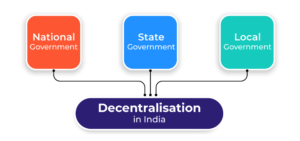Q. To what extent, in your opinion, has the decentralization of power in India changed the governance landscape at the grassroots?
Ans: In my opinion, the decentralization of power in India has brought about significant changes to the governance landscape at the grassroots level, fostering greater local participation, accountability, and tailored development. This shift has been most prominently facilitated by the 73rd and 74th Constitutional Amendments, which established a framework for decentralized governance at the rural and urban levels through Panchayats and Municipalities, respectively.

How decentralization has impacted the decentralization at the grassroots level?
- Empowerment of Local Bodies: Decentralization has empowered local self-government institutions, such as Panchayats and Municipalities, by providing them with constitutionally mandated responsibilities and funds. This has enabled them to take charge of local development planning, resource allocation, and service delivery.
- Enhanced Local Participation: Decentralization encourages active participation of local communities in decision-making processes. Through Gram Sabhas and Ward Committees, citizens can voice their concerns, suggest development projects, and hold local leaders accountable for their actions.
- Customized Development: Decentralized governance allows for a better understanding of local needs and priorities. Local bodies are better equipped to design and implement development projects that are tailored to the unique requirements of their communities.
- Increased Accountability: Local representatives are directly accountable to their constituents, promoting transparency and reducing bureaucratic hurdles. The proximity between local leaders and citizens enhances their responsibility towards effective governance.
- Social Inclusion: Decentralization has the potential to address social inequalities by ensuring that marginalized and underrepresented sections of society have a say in local decision-making and resource allocation.
- Improved Service Delivery: With decision-making authority shifted to the grassroots level, services like healthcare, education, sanitation, and infrastructure development can be more efficiently planned and delivered to meet local demands.
- Political Training and Awareness: Decentralization encourages local leaders to take on responsibilities, fostering their political skills and raising awareness about governance principles among citizens.
- Experimentation and Learning: Local bodies have the flexibility to experiment with innovative policies and practices, facilitating learning from successes and failures, and potentially serving as models for replication elsewhere.
- Challenges and Variation: While decentralization has brought positive changes, challenges persist. Disparities in capacity and resources among different states and regions affect the extent to which decentralization has been effectively implemented. In some cases, political interference and inadequate fiscal devolution can hinder the desired outcomes.
- Democratic Values: Overall, decentralization reinforces democratic values by expanding citizen participation, promoting inclusive governance, and distributing power more equitably.
In conclusion, the decentralization of power in India has transformed the governance landscape at the grassroots level by empowering local bodies, enhancing participation and accountability, and promoting tailored development. While challenges remain, the shift towards decentralized governance has the potential to create a more responsive, accountable, and participatory governance system that addresses the diverse needs of India’s vast and varied population.
Thanks for reading the answer to the question: To what extent, in your opinion, has the decentralization of power in India changed the governance landscape at the grassroots?